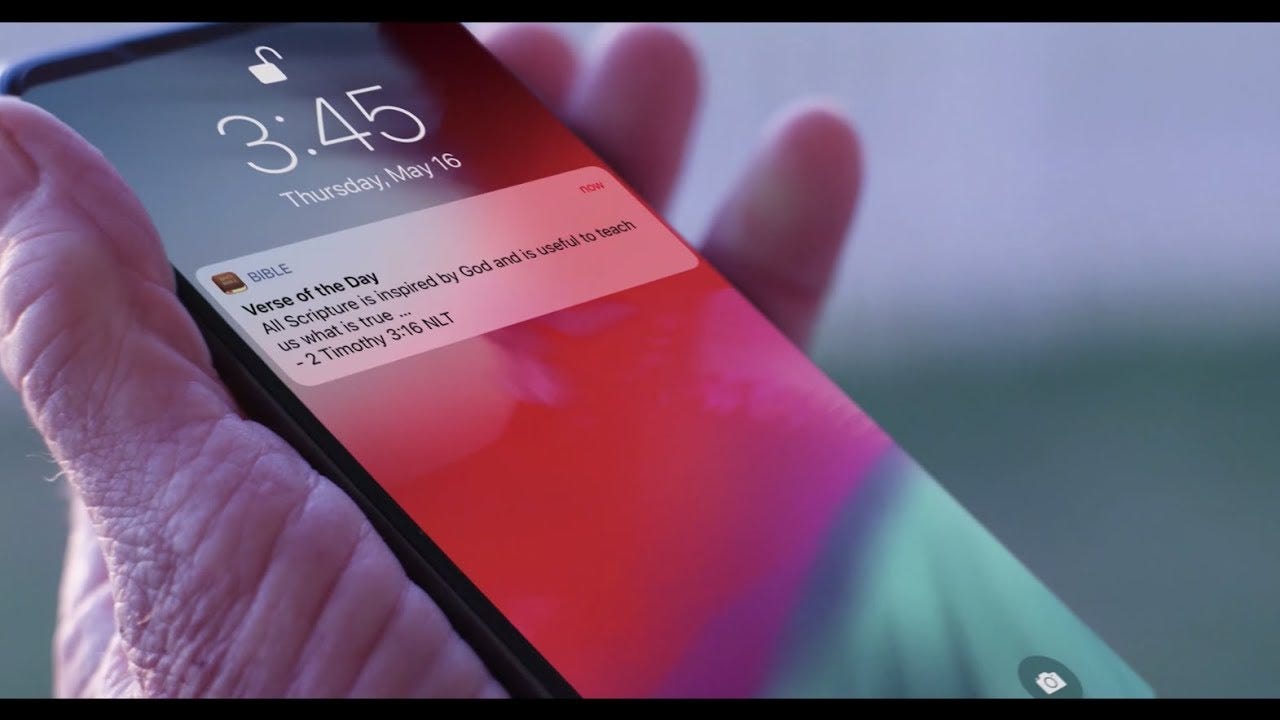Can Technology Help Bible Intake?
Scripture On Digital Doorposts
You’ve heard of the Ten Commandments. But have you heard of the Ten Ways of remembering the commandments? Deuteronomy 6:6-9 is God telling Israel, through Moses, how to remind themselves of God’s laws and decrees. There are ten ways:
Most centrally, God’s commands are to, “be on your hearts.”1
“Impress them on your children.”
“Talk about them when you sit at home”
“[Talk about them] when you walk along the road”
“[Talk about them] when you lie down”
“[Talk about them] when you get up.”
“Tie them as symbols on your hands”
“bind them on your foreheads.”
“Write them on the doorframes of your houses”
“[Write them on] your gates.”
This list is repeated in Deuteronomy 11:18-21. The repetition implies importance. Don’t get me wrong, the Ten Commandments are the most important, but we should not neglect the Ten Ways of remembering, reflecting, and meditating on God’s commands.
We can apply these verses to modern doorframes and modern gates: iPhone screens, SmartHome Devices, and Bluetooth audio.
The Three Basics Of Technology Use
Let me say upfront: technology can go too far. I bring a printed Bible to church and see good reasons for doing so. But I also think Christians should be encouraged to leverage technology for godly purposes, including with Scripture. I agree with Trevor Wax, who says,
I’m not pro-Bibles-online as a replacement for engaging the Bible in print… we need to be aware of the losses we will experience if we shift to online Bible reading as the primary or only way we encounter the Bible.
So keep the written word. But feel free to add to it - as long as you take a careful assessment of the impacts of those other forms of technology. Get the baby as little bathwater as you can. Here are three basics of assessing any technological medium.
First, the medium shapes the message.
Would you rather receive a handwritten note saying “I love you” or a text message? The content may be the same but the note, with its imperfect handwriting, took more effort and remains as a permanent artifact to touch and hold. God is not neutral in regards to different mediums of accessing his word: he specifically wanted a written word so that he would be clear (see Deut. 1:1-5 and 27:8). The same content takes a different meaning when delivered through different technologies. The medium shapes the message.2
Second, the medium shapes you.
As the authors of one study demonstrated, increased use of the internet impacts attentional capacities (as the constantly evolving stream of online information encourages divided attention at the expense of sustained concentration) and our memory processes (as we increasingly rely on external brains instead of our own - just ask a 20-year-old if he can recall his mum and dad’s cell phone number). Digital Bibles can negatively impact our ability to focus and remember. The medium shapes you. This brings me to the next point.
Third, the medium is neither solely good, bad, or neutral, but it is good.
Tony Reinke and John Dyer have written extensively on this. Since God’s purpose was for us to fill creation, cultivating and stewarding it, and since God’s people one day reign not in a garden but in a city, we should be tech-optimists seeing the nature of technology as fundamentally good (though tainted by sin). The printed Bible itself has limitations since it has added verse & chapter numbers as well as subheadings that are not inspired by God. The technology of chapter and verse might negatively impact your ability to see the wider context of a book. Recall that in church history, the normative way to access God’s word was to listen to it rather than read it. Each medium has its impacts but all mediums are, in one way or another, good.
Treat God’s Word as primary and the form of God’s word as an important secondary consideration.
Write God’s Decrees On Your Digital Devices
According to Biblical scholars, the Jews took the Ten Ways literally with their phylacteries and ‘Mezuzots,’ boxes attached to the doorposts, each containing the Shema as their principal texts.3
The Ten Ways move from the private individual to a family setting and then to public society: from in your hearts, to in your conversations, and then to physical manifestations readily viewable.
I’ve made the personal rule (aka “scruple”) to never read Twitter until I’ve read a chapter of Scripture first. I’ve done this on my phone. Just as a Jewish person would pass through a doorway of Scripture before entering into the world, so too do I pass through a chapter of Scripture before entering the online world.4
Image credit: https://thesweetsetup.com/apps/best-bible-app-ios/
Ideas For Saturating Your Digital World With Scripture
Here are a few ideas. I’ll discuss audio options, social media use, and website use.
Audio Options
If you have a SmartHome device like Alexa or Google Home then you can have your device read Scripture to you in the midst of your cleaning. Try it.
There are plenty of free audio Bible options that exist. You can subscribe to a podcast that goes through the Bible in a year with some commentary at the end, use a website like BibleGateway.org, or download an audio Bible app like YouVersion or the ESV Mobile App.
For more options with your audio Bible experience, I recommend the Dwell Bible App. It offers 10+ voices, background music options, and a ton of customization for listening plans and preferences. I used to use it every day on my commute to work. I changed the settings to pause the audio of the Bible, but not the music, for 30 seconds at the end of each chapter to leave time for reflection and prayer.
Social Media Use
If you say, “I just go on social media for x and not for Scripture,” you are at risk of disobeying Deutoromy 6:8. There’s no reason why talking about God’s Commands shouldn’t include our digital conversations.
Perhaps Instagram and Pinterest would be an exception since they are so overwhelmingly image-based that Scripture doesn’t fit as well, but how might those places be more godly if they were more infused with God’s word?
If you’re on Twitter, you can follow people like John Piper who pretty much only post Scripture or a Daily Bible account. If you’re on Reddit, then subscribe to /r/Reformed for some healthy content.
Ultimately, we need to ask ourselves a question, do the accounts I follow on social media better represent my identity on earth or my identity in heaven?
Bible Tools
There’s a lot of power in apps like Logos and Accordance. They are expensive, but they help you dive deeper into the complexities of God’s Word. A couple of free versions are BibleHub.com, and BibleWebApp, and two translations you may not have heard of but have helpful websites: NET Bible and Y’allVersion.
The YouVersion Bible app is far and away the most popular app. Some of the gimmicks feel, well, like gimmicks, whether it be “reading streaks” or the notifications to start a new reading plan crafted by a famous Christian celebrity. YouVersion has gamified the Bible app to make it more addictive. Is that really so wrong? Many things they have done are good and I’m glad for them. I’ve enjoyed the social integration and the ease of use.
I also read YouVersion’s daily verse. There are limitations to reading a single Bible verse - since you might miss the surrounding context. But God didn’t expect the Israelites to recite the whole Torah every time they talked about it or every time they passed by the gate. It’s good to memorize verses and be reminded of them.
I used to fear that seeing an individual verse in the midst of my Twitter scrolling or YouTube watching would diminish the respect I had for Scripture. What if I treat God’s Word in the same way I treat a message from a friend about the basketball game or worse, like a spam email message that pops-up on my phone - building a habit of ignoring God’s Word? This is a risk. The medium isn’t natural. And so I respect those people who choose to avoid digital Scripture.
Conclusion
With any technology, be aware of its limits. Be aware how the medium is shaping the message. How the medium is shaping you. The Bible app is a good app and it’s better than 95% of the other apps on my phone.
The digitization of Scripture changes the way you understand it. You may think of Scripture as trite, inconsequential, or bland in comparison to the hyper-personalization of the rest of your digital world.
The digitization of Scripture may also be changing you - leading you to less attentive reflection, prayer, and distraction-less peace.
But, the digitization of Scripture may be of great use to you. It may help you better follow Jesus in all your conversations, locations, and doorways.
While our physical doorframe may be different from our modern screens, the same principles apply.
Use tech. Glorify God.
As per NET notes, “In OT physiology the heart (לֵב, לֵבָב; levav, lev) was considered the seat of the mind or intellect, so that one could think with one’s heart.” Biblical Studies Press, The NET Bible First Edition Notes (Biblical Studies Press, 2006), Dt 6:5.
Yes, this is influenced by Neil Postman’s The Medium Is The Metaphor which was influenced by Marshall McLuhan’s The Medium Is The Message / Mass-age.
Edward J. Woods, Deuteronomy: An Introduction and Commentary, ed. David G. Firth, vol. 5, Tyndale Old Testament Commentaries (Nottingham, England: Inter-Varsity Press, 2011), 137. However, according to Stephen Dempster, the commands for physical manifestation were intended to be taken figuratively (see NIV Biblical Theology Study Bible), but Dempster seems to be unique in his interpretation. Jesus condemns a hypocritical use of the physical artificats in Matt. 23:5 but not the use of the physical artifacts themselves.
I also read my Bible app’s daily verse. There are limitations to reading a single Bible verse - since you might miss the surrounding context. But God didn’t expect the Israelites to recite the whole Torah every time they talked about it or every time they passed by the gate. It’s good to memorize verses and be reminded of them.




